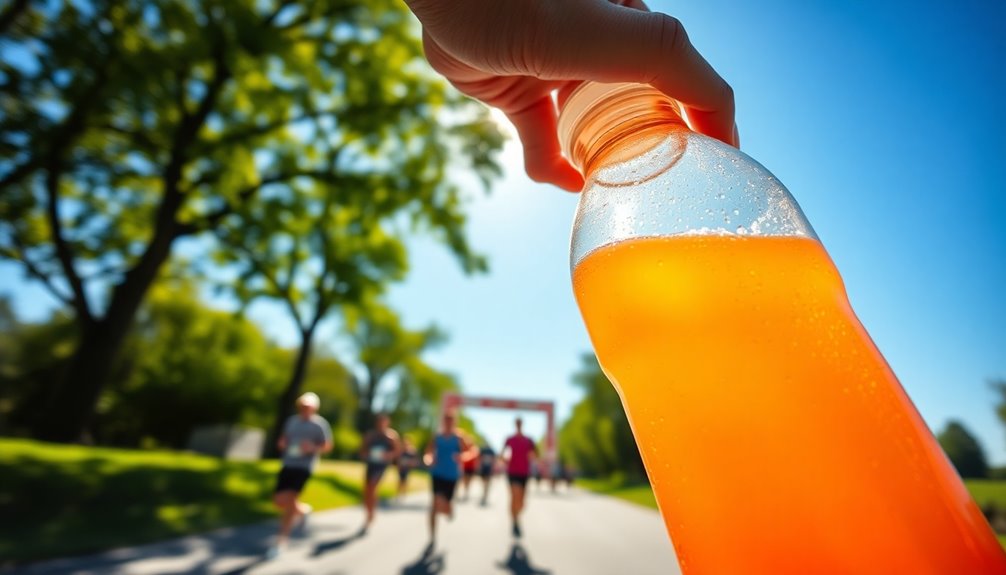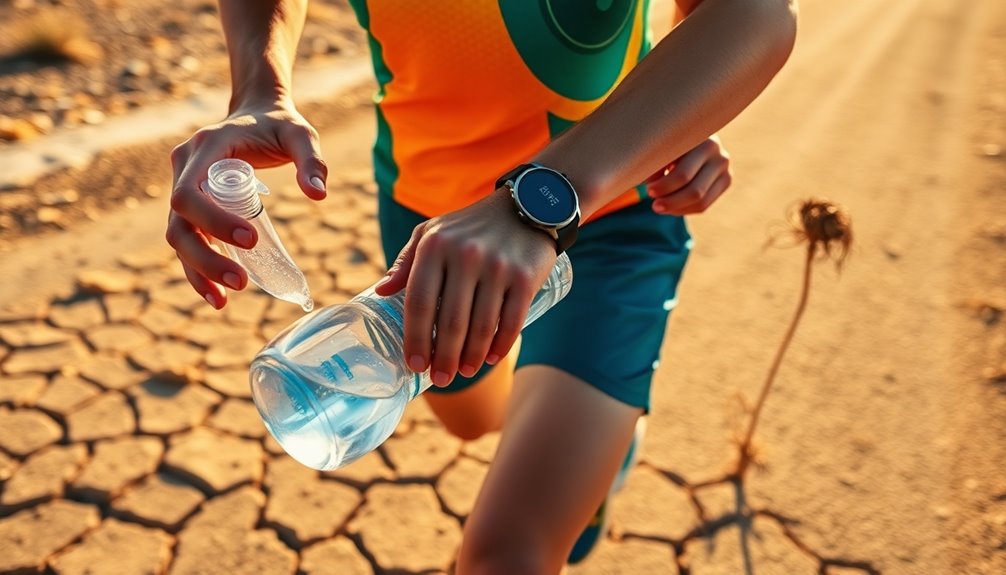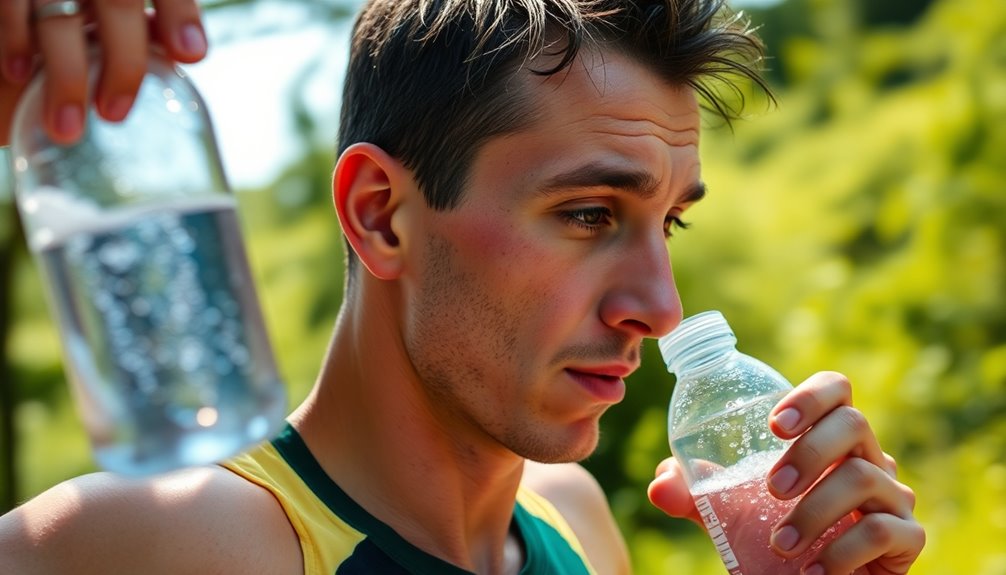Proper hydration's critical for your running performance. Even a 2% loss in body weight can impair your abilities, increasing fatigue and heart rate. Staying hydrated keeps your cognitive function sharp and reduces the risk of muscle cramping. It's important to monitor urine color and replenish lost fluids regularly. Balancing electrolytes is also essential for peak performance. Want to optimize your hydration strategy? There's more important information ahead that can help you enhance your runs.
Key Takeaways
- Proper hydration enhances running performance, preventing a 2% body weight loss that can impair abilities and cognitive function.
- Monitoring urine color, aiming for pale straw, helps assess hydration status effectively during training.
- Consuming fluids regularly, about 50ml to 250ml every 20 minutes, maintains optimal hydration levels throughout runs.
- Electrolyte balance, particularly sodium, is crucial for recovery and performance, with at least 700mg per liter of fluid recommended.
- Rehydrating within the first hour post-run and targeting 1.5 times the fluid lost supports recovery and endurance.
Why Proper Hydration Is Essential for Runners

When you hit the pavement, staying properly hydrated is essential for your running performance. Even a 2% loss in body weight due to dehydration can greatly impair your abilities, increasing heart rate and perceived exertion while reducing cognitive function.
You might lose up to 2 quarts of fluid per hour during intense runs, making it vital to drink regularly before, during, and after your workouts. Monitoring your urine color can help gauge your hydration status—pale straw indicates you're good to go, while darker shades signal a need for more fluids.
Don't forget about electrolytes, especially sodium; aim for at least 700mg per liter of consumed fluid to guarantee peak performance. Incorporating protein-rich breakfast options can also aid in recovery and hydration after your runs.
Personalize your hydration strategy based on sweat rate and conditions for the best results.
Understanding Dehydration and Its Impact on Performance

Dehydration can sneak up on you, impacting your running performance before you even realize it.
Recognizing symptoms like muscle cramping and fatigue is essential, as is understanding how dehydration affects your endurance and decision-making. Additionally, open communication about hydration habits can help improve your overall performance and well-being.
Let's explore the signs to watch for, the factors that hinder your performance, and effective hydration monitoring techniques.
Dehydration Symptoms to Recognize
Recognizing the early signs of dehydration is vital for maintaining ideal running performance. You should pay attention to symptoms like dry mouth, dark yellow urine, and fatigue, as these indicate your hydration levels are dropping.
Muscle cramping can also occur, signaling that your body isn't getting enough fluids. Even a 2% loss in body weight can hinder your cognitive performance and increase perceived exertion, making your runs feel tougher.
If you notice any of these symptoms, it's important to rehydrate immediately. Chronic dehydration can lead to more severe issues, including low blood pressure and confusion.
Keep an eye on your urine color; aim for pale straw-yellow to guarantee you're staying properly hydrated and supporting your running goals. Additionally, maintaining good indoor air quality with allergen reduction can further enhance your overall performance by promoting better respiratory health during your runs.
Performance Impairment Factors
Maintaining proper hydration is essential not just for preventing dehydration symptoms but also for enhancing your running performance. Dehydration can considerably impair your performance by disrupting fluid balance, raising body temperature, and increasing heart rate.
Even a 2% loss in body weight affects cognitive function and mood, making runs feel tougher.
- Increased heart rate and perceived exertion
- Elevated core body temperature
- Accelerated fatigue and muscle cramping
- Decreased overall effectiveness and reaction time
To meet your hydration needs, drink regularly throughout the day; thirst isn't always a reliable indicator, especially during prolonged exercise or in hot conditions. Additionally, incorporating detoxifying juices into your routine can support hydration and overall health.
Prioritize hydration to maintain peak performance and keep fatigue at bay.
Hydration Monitoring Techniques
How can you effectively monitor your hydration levels to guarantee peak running performance?
Start by using hydration monitoring techniques like checking your urine color. A pale straw yellow indicates you're well-hydrated, while darker shades signal a need to drink enough water.
Additionally, conduct a sweat test by weighing yourself before and after runs to assess fluid loss accurately. This insight helps tailor your hydration strategy.
Aim to replace lost fluids within 1.5 to 2 hours post-exercise to support adequate hydration and recovery.
During longer runs, make it a habit to consume about 50ml to 250ml every 20 minutes.
Staying on top of these practices can greatly enhance your endurance and overall performance while preventing the cognitive decline associated with dehydration. Incorporating low-impact exercises can also help maintain hydration levels during workouts.
The Importance of Electrolytes in Your Hydration Strategy

While you might focus on staying hydrated during your runs, don't overlook the vital role electrolytes play in your overall hydration strategy. Proper electrolyte balance is essential for peak athletic performance, particularly sodium, potassium, and magnesium.
Here's why you should prioritize electrolytes:
- Sodium loss can reach over 2,000mg per liter of sweat.
- At least 700mg of sodium per liter of fluid is recommended for endurance running.
- Sports drinks and salted snacks can replenish lost electrolytes effectively.
- Sweat tests can help personalize your hydration plan.
- Additionally, incorporating natural pain relievers like turmeric may help mitigate discomfort from prolonged physical activity.
Recommended Hydration Practices Before, During, and After Running

To maximize your running performance, it's essential to focus on hydration before, during, and after your runs.
Start by drinking enough water to prepare your body, then maintain fluid intake while you run, especially during longer sessions.
Finally, don't forget to replenish lost fluids post-run to support recovery and keep your hydration levels balanced. Additionally, consider using air purifiers to improve indoor air quality, which can enhance your overall performance.
Pre-Run Hydration Strategies
Proper hydration before a run is essential for maximizing your performance and endurance.
To implement effective pre-run hydration strategies, consider the following tips:
- Drink 16 to 20 oz. of fluid at least 30 minutes before your run.
- Monitor urine color; aim for a pale straw color to guarantee ideal hydration.
- Incorporate fluid and electrolytes the night before intense efforts, like PreLoad, to enhance performance.
- Make a habit of regularly sipping water throughout the day to drink enough.
- Additionally, using a HEPA filtration system in your environment can lead to improved air quality, which may also benefit your overall performance.
Hydration During Running
Maintaining hydration during your run is essential for sustaining energy and performance. You’ll lose water through sweat, so drinking enough is vital, especially for runs over an hour. Aim for 50ml to 250ml of fluid every 20 minutes to replace sweat losses. Monitor your urine color; pale straw indicates proper hydration, while darker shades suggest you need to stay hydrated. On hot days, increase your intake and consider your individual sweat rate. Don’t forget to replenish electrolytes to support your sports nutrition. Additionally, staying well-hydrated can enhance emotional resilience, which is crucial for maintaining motivation during long runs. To optimize your hydration strategy, it’s important to plan ahead, especially for longer runs. Consider incorporating hydration tips for everyday running into your routine, such as carrying a water bottle or utilizing hydration packs for easy access to fluids. Additionally, experiment with different hydration solutions, like electrolyte drinks or gels, to find what works best for your body and helps sustain your energy levels throughout your workouts.
| Time (Minutes) | Fluid Intake (ml) | Notes |
|---|---|---|
| 0-20 | 50-250 | Start hydrating early |
| 20-40 | 50-250 | Maintain hydration |
| 40-60 | 50-250 | Adjust for heat |
| 60+ | As needed | Focus on rehydration |
Post-Run Recovery Fluids
After you've completed your run, rehydrating effectively is essential for recovery and performance. Aim to drink within the first hour, targeting 1.5 times the fluid lost during your run.
Here are some key practices for post-run hydration:
- Consume a recovery drink with a 2:1 carbohydrate-to-protein ratio within 30 minutes.
- Replenish electrolytes, especially sodium, to aid recovery.
- Monitor urine color; pale straw indicates good hydration, while darker shades suggest you need more fluids.
- Tailor your hydration strategy based on sweat rates and conditions.
- Consider using an air purifier to improve indoor air quality, as improved air quality can enhance overall recovery and respiratory health.
Signs and Symptoms of Dehydration to Watch For

Dehydration can sneak up on you during a run, so it's vital to recognize the signs and symptoms early. Watch for indicators like dark yellow urine, which signals that your hydration status is off. Muscle cramping, fatigue, and dizziness are also red flags that can hinder your performance. Remember, even a 2% body weight loss can impair your cognitive function and mood, making running more challenging.
| Signs/Symptoms | Description | Action Needed |
|---|---|---|
| Dark Yellow Urine | Indicates dehydration | Increase fluid intake |
| Muscle Cramping | Painful contractions of muscles | Hydrate and rest |
| Fatigue | Extreme tiredness | Reassess hydration status |
| Dizziness | Lightheadedness | Stop and hydrate |
| Pale Straw-Colored Urine | Indicates proper hydration | Maintain fluid intake |
Balancing Hydration: Avoiding the Risks of Overhydration

Recognizing the signs of dehydration is just one part of the hydration equation; you also need to be aware of the risks of overhydration.
Overhydration, or hyponatremia, happens when you drink too much water, diluting sodium levels in your body. This can lead to serious symptoms that affect your performance:
- Nausea or stomach sloshing
- Confusion and dizziness
- Vomiting
- Risk of collapse
To avoid these risks during endurance sports, monitor your hydration and sodium intake.
Aim for at least 700mg of sodium per liter of fluid consumed, especially in hot conditions. Your hydration strategy should balance both fluids and electrolytes to maintain peak performance and prevent the adverse effects of overhydration.
Frequently Asked Questions
What Is the Role of Hydration in Performance?
Hydration plays an essential role in your performance by maintaining blood volume and regulating body temperature.
When you're properly hydrated, you enhance your endurance and cognitive function, helping you stay focused and responsive. Losing even a small amount of body weight from dehydration can hinder your athletic abilities.
How Does Dehydration Affect Running Performance?
Dehydration can greatly affect your running performance. When you lose even a small amount of body weight from fluid loss, you might notice an increase in heart rate and perceived exertion.
This can lead to faster fatigue and reduced endurance. You may experience symptoms like muscle cramps and dry mouth, making it harder to maintain your pace or focus.
Ultimately, dehydration can impair your decision-making and reaction times, increasing your injury risk.
Will Being Hydrated Make Me Run Faster?
Think of your body as a finely-tuned engine; hydration is the oil that keeps everything running smoothly.
Yes, being hydrated can help you run faster. When you're well-hydrated, your blood volume stays ideal, delivering oxygen to your muscles efficiently. This not only enhances endurance but also reduces fatigue.
Plus, staying hydrated sharpens your focus, helping you make better pacing decisions.
When 2% Dehydration Is Present, There Is __________ Reduction of Athletic Performance.?
When you experience 2% dehydration, you can see a significant reduction in your athletic performance, potentially by 10-20%.
This level of dehydration impacts your strength, endurance, and overall efficiency. You might notice decreased cognitive function, slower reaction times, and impaired decision-making, all vital for peak performance.
Additionally, your heart rate increases, making exercise feel harder and reducing your tolerance.
Staying hydrated is essential to maintain your best performance levels.
Conclusion
In running, hydration is like fuel for your engine; without it, you can sputter and stall. Just like a car that runs out of gas, you'll find your energy plummeting and your performance suffering. Remember, studies show that even a 2% drop in body weight from dehydration can lead to a 10% decrease in performance. So, keep your water bottle handy, listen to your body, and stay ahead of the game to guarantee each stride counts.









